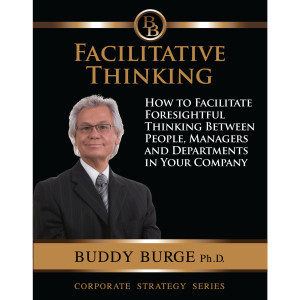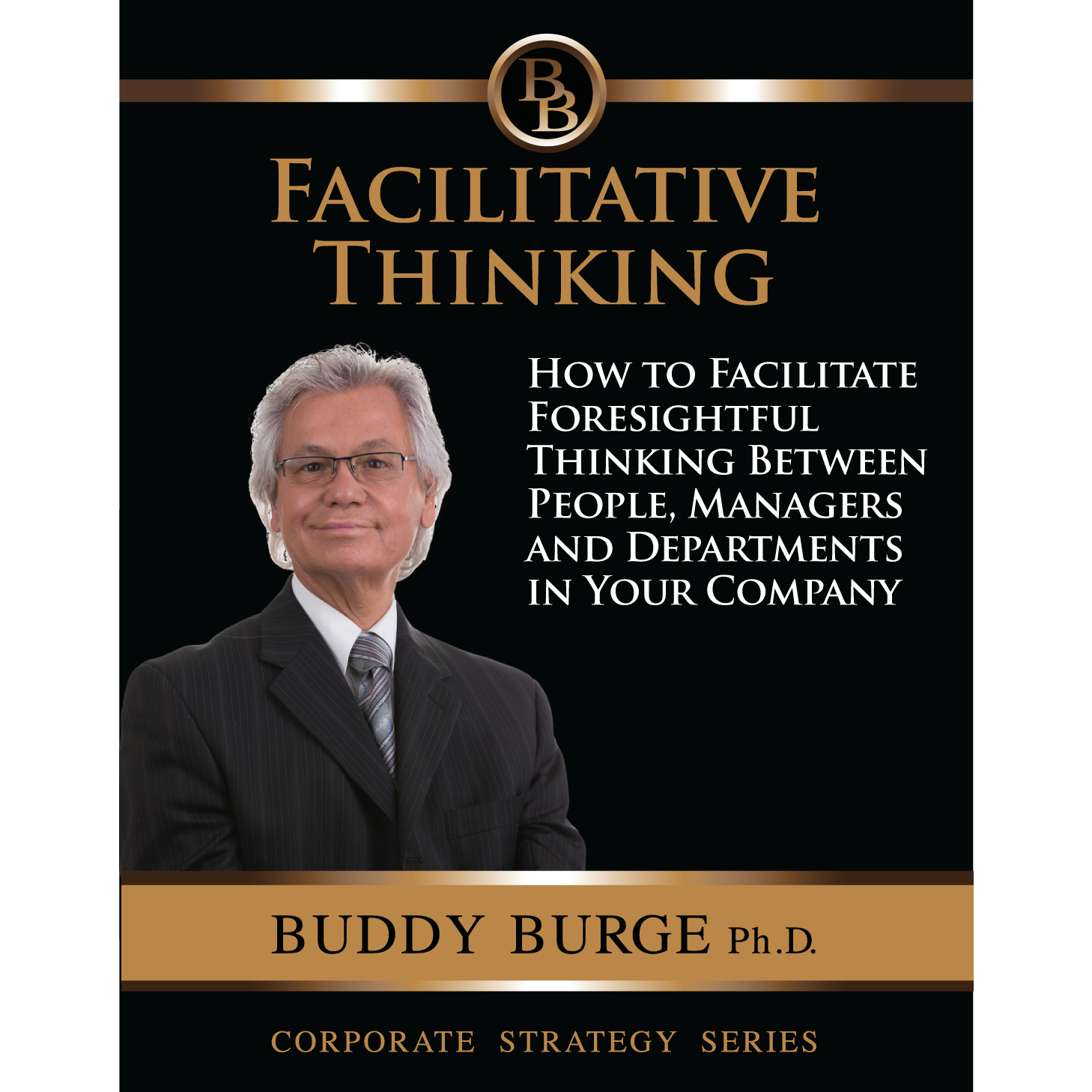This article is an excerpt taken from Buddy’s book “Facilitative Thinking”
In the first two articles, we discussed six ways that people can improve upon their “Luck”.
In this third and final article, we will look at three more “Good Luck” strategies.
Improve your Luck Strategy Number Seven:
There’s Only One Truly Definitive Form of Luck
And that’s the luck that ends the game.
If Southwest for instance had missed an opportunity to open in a new city or grab a set of gates at a new airport, it still could have turned itself into a great company.
But if Southwest had been knocked out of business with a plane crash in its first week of operation, it likely would have lost forever the chance to become a great company.
Remember the essential first half of Nietzsche’s quote, “What does not kill me…”
Improve your Luck Strategy Number Eight:
Luck is Not a Strategy
Life offers no guarantees.
But it does offer strategies for managing the odds, indeed, even managing luck.
The essence of “managing luck” involves four things:
(1) Cultivating the ability to zoom out to recognize luck when it happens
(2) Developing the wisdom to see when and when not, to let luck disrupt your plans
(3) Being sufficiently well-prepared to endure an inevitable spate of bad luck
(4) Creating a positive return on luck, both good luck and bad, when it comes.
Improve your Luck Strategy Number Nine:
Luck is not a Strategy, But Getting a Positive Return on Luck Is
And how would you get the highest possible return on luck?
Yes, life is uncertain, full of big, consequential forces that we can neither predict nor control.
Yes, luck is uncertain, uncontrollable, and consequential.
The Key is to get a Great ROL
Successful people never relax when blessed with good luck.
They never wallow in despair when hit with bad luck.
They keep pushing, driving for the overall goal and cause.
When successful people get a lucky break, they seize it and then build upon it, not just for days or weeks but for years or decades.
They build a culture that can achieve results whether it gets good luck or bad, engendering deep confidence that success, in the end, doesn’t depend upon luck.
An Example of Return on Luck: Progressive Finds a Pony in the Pile of Manure
When something “negative” happens, learn to see it as life giving you a lovely little gift but wrapping it in an ugly package.
This event or situation is not simply a good thing, a lovely little gift.
Nor is it a bad thing, an ugly package.
It is both!
When the insurance industry in California was pulverized by Proposition 103, CEO Peter Lewis saw it as a gift.
He then used this gift to deepen the company’s core purpose, to reduce the economic cost and trauma caused by auto accidents.
Progressive Created “Immediate Response” Claims Service
No matter what time you had an accident, 24 hours a day, seven days a week, 365 days a year, Progressive would be available to help.
Claims adjusters would work from a fleet of vans and SUVs dispatched to policyholder homes or even directly to an accident.
By 1995, 80 percent of the time the Progressive adjuster would’ve gone to a customer ready to issue a check within 24 hours of an accident.
In 1987, the year before Proposition 103, Progressive ranked number 13 in the American private-passenger auto-insurance market; by 2002, it reached number 4.
Years later, Lewis called Proposition 103 “the best thing that ever happened to this company.”
By marrying creativity with empirical validation, they can fire big cannonballs that don’t rely on luck for ultimate success.
Uncalibrated cannonballs require luck for a successful outcome; calibrated cannonballs do not.
By building big buffers and margins of safety, they give themselves more options for responding to luck.
Summary: Return on Luck Key Points
We defined a luck event as one that meets three tests:
(1) Some significant aspect of the event occurs largely or entirely independent of the actions of the key actors in the enterprise
(2) The event has a potentially significant consequence (good or bad)
(3) The event has some element of unpredictability.
Luck is when Opportunity meets Preparation
Seneca, a first-century Roman philosopher, allegedly said, “Luck is where the crossroads of opportunity and preparation meet.”
My personal favourite is, “Work really hard so that you are ready when luck or fortune (perchance or when you least expect it) shines upon you.”
Observations and Characteristics of Luck
Jim Collins and Horace Hansen Conclusions were:
- Luck happens, a lot, both good luck and bad luck.
- Every company in the research on luck experiences significant luck events.
- Yet the successful people cases were not generally luckier than the comparison cases.
- The successful people companies did not generally get more good luck than the comparisons.
- The successful people companies did not generally get less bad luck than the comparisons.
- The successful people companies did not get their good luck earlier than the comparisons.
- The successful people companies cannot be explained by a single giant-luck spike.
Back to the Two Extreme Views about Luck
One extreme holds that luck is the primary cause of successful people success.
The other extreme holds that luck plays no role in successful people success.
Both views are not supported by the evidence from research.
The critical question is not “Are you lucky?” but “Do you get a high return on luck?”
There are four possible ROL scenarios:
- Great return on good luck
- Poor return on good luck
- Great return on bad luck
- Poor return on bad luck
There is a Strange Asymmetry between Good Luck and Bad
A single stroke of good fortune, no matter how big, cannot by itself make a great company.
But a single stroke of extremely bad luck, or an extended sequence of bad-luck events that create a catastrophic outcome, can terminate the quest.
There’s only one truly definitive form of luck, and that’s the luck that ends the game.
The Most Important Issue about Luck: ROL
Successful people assume they’ll get a spate of bad luck and prepare ahead of time.
The life skills in this book and other places such as firing bullets, then cannonballs, all contribute directly to earning a great ROL.
Successful people credit good luck as a contributor to their success, despite the undeniable fact that others also experienced good luck, but they never blame bad luck for setbacks or failures.
We Fail Not For Lack of Luck But Because We Squander It
Some people have extraordinarily good luck, better luck even than more successful people, yet we fail because they squander it.
Successful people get a substantial amount of bad luck, just like the rest of us yet manage to get a great ROL.
This is when successful peoples really shine, exemplifying the philosophy, “What does not kill me, makes me stronger.”
ROL might be an even more important concept than:
- Return on assets (ROA)
- Return on equity (ROE)
- Return on sales (ROS)
- Return on investment (ROI).
“Who Luck”, the luck of finding the right mentor, partner, teammate, leader, friend, is one of the most important types of luck.
The best way to find a strong current of good luck is to swim with great people, and to build deep and enduring relationships with people for whom you’d risk your life and who’d risk their lives for you.
Key Questions
- What significant luck events have you experienced in the last decade?
- Did you get a high return on luck?
- Why or why not?
- What can you do to increase your return on luck?
Bonus Question
The really important question to ask ourselves is, Who is your best luck?
There you have it; nine ways to improve your luck.
Best of luck, everybody.
For more on this topic, we recommend the following | |
 | Facilitative ThinkingHow to Facilitate Foresightful Thinking Click Here For Video and Full Description If you found this article useful |


![CropperCapture[205]](http://buddyburge.com/wp-content/uploads/2014/02/CropperCapture2051-237x300.png)
![CropperCapture[206]](http://buddyburge.com/wp-content/uploads/2014/02/CropperCapture2061-300x202.png)
![CropperCapture[207]](http://buddyburge.com/wp-content/uploads/2014/02/CropperCapture2071-300x291.png)
![CropperCapture[208]](http://buddyburge.com/wp-content/uploads/2014/02/CropperCapture2081-300x300.png)
![CropperCapture[210]](http://buddyburge.com/wp-content/uploads/2014/02/CropperCapture2101-300x228.png)
![CropperCapture[211]](http://buddyburge.com/wp-content/uploads/2014/02/CropperCapture211-298x300.png)
![CropperCapture[212]](http://buddyburge.com/wp-content/uploads/2014/02/CropperCapture212-300x246.png)
![CropperCapture[213]](http://buddyburge.com/wp-content/uploads/2014/02/CropperCapture213-222x300.png)
![CropperCapture[214]](http://buddyburge.com/wp-content/uploads/2014/02/CropperCapture214-300x176.png)
